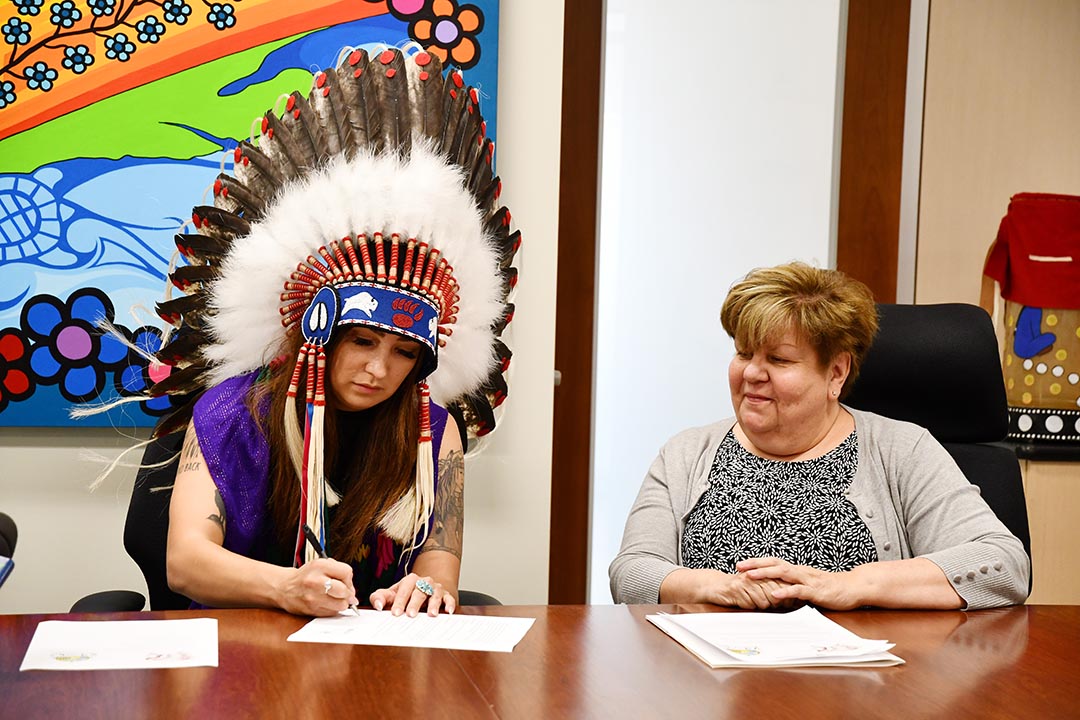
Pewaseskwan at USask signs MOU with SFNWC to support research with Indigenous women
TREATY 6 TERRITORY (SASKATOON) – The Saskatchewan First Nations Women’s Commission (SFNWC) at the Federation of Sovereign Indigenous Nations (FSIN) and pewaseskwan—the Indigenous Wellness Research Group (IWRG) at the University of Saskatchewan (USask)—are signing a memorandum of understanding on June 24 to commemorate the start of a research alliance.
Undertaken in the spirit of reconciliation, pewaseskwan and the SFNWC will work towards a shared accountability framework which meaningfully operationalizes the existing FSIN/USask MOU and supports Indigenous research.
Dr. Alexandra King (MD, FRCPC), Cameco Chair in Indigenous Health and Wellness, co-leads pewaseskwan in its research. She met with FSIN Vice-Chief Aly Bear to sign the agreement on Friday at pewaseskwan’s offices on the USask campus.
“We are excited to partner with the pewaseskwan research team as we collaborate to ensure research regarding First Nations communities is community-led, respects our cultural values and helps create a future our communities are working towards,” said Bear.
“This is an important step in our partnership with the FSIN. We look forward to strengthening our research with First Nations communities and working with the SFNWC we’ll be able to pursue opportunities that are culturally safe, and community led,” said King, a citizen of the Nipissing First Nation in Ontario.
Pewaseskwan and the SFNWC are committed to increasing Indigenous leadership of, participation in, and benefit from community-driven and -centric Indigenous health research across the province. The partnership will explore opportunities for collaboration in academic and community research, especially in the areas of Indigenous cultural expression, health and wellness, environmental conservation and stewardship, and food sovereignty.
Pewaseskwan focuses its research on Indigenous health and wellness, with teams at Simon Fraser University in B.C. and USask led by Dr. King and Professor Malcolm King. The teams collaborate with Indigenous communities, supporting them as they undertake their own health and wellness research using a different approach to engagement, relationships, research, and research services—all of which will better enable Indigenous communities to do their own health and wellness research.
Pewaseskwan is a Cree term that means “the sky is starting to clear” or “the weather is improving.” The term reflects an opportunity to get out on the land after a storm for Indigenous communities. For Dr. King and the IWRG, it reflects optimism for a healthier future, bringing together the best of Indigenous and Western worldviews through etuaptmumk, a Two-eyed Seeing approach utilizing Indigenous and Western knowledges together.
The FSIN represents 74 First Nations in Saskatchewan. The federation is committed to honouring the spirit and intent of the Treaties, as well as the promotion, protection and implementation of the Treaty promises that were made more than a century ago.
The SFNWC is committed to the development and sustenance of healthy communities within which all First Nations people thrive. This commission is mandated to advance the human rights of First Nations women, children, and communities, and to address the systemic racism First Nations women face in all sectors. The commission also conducts advocacy work on behalf of First Nations women, children, and communities.
-30-
For more information, contact:
Sarah MacDonald
Communications Officer
sarah.macdonald@mail.usask.ca
306-260-0767
Sam Campling
FSIN Communications
sam.campling@fsin.com
communications@fsin.com
306-665-1215

